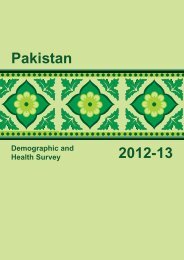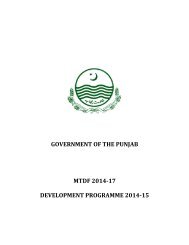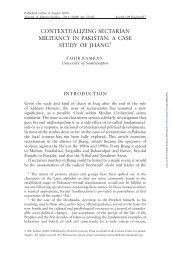- Page 5 and 6: To Abdullah Sandhu, My Sweet Son v
- Page 7 and 8: ACKNOWLEDGEMENT In the Name of Alla
- Page 9 and 10: I cannot forget the help accorded t
- Page 11 and 12: PREFACE The Muslims entered the Sub
- Page 13 and 14: were made by the League leadership
- Page 15 and 16: established themselves in the rural
- Page 17: movement, a researcher has to deal
- Page 21 and 22: through the streets of the Punjabi
- Page 23 and 24: xxiii and secondary documents in th
- Page 25 and 26: of the Subcontinent. The major poli
- Page 27 and 28: xxvii Congress, which could award t
- Page 29 and 30: INTRODUCTION MUSLIM-SIKH RELATIONS
- Page 31 and 32: interest in the Islamic heritage mo
- Page 33 and 34: upon their own kinspersons. Chandu
- Page 35 and 36: Aurangzeb Alamgir (1618-1707) decid
- Page 37 and 38: period was hard for Sikhs. Mir Mann
- Page 39 and 40: intolerance and repression; the Sik
- Page 41 and 42: soon succeeded in winning over the
- Page 43 and 44: However, the British adopted secula
- Page 45 and 46: constitutional packages. The method
- Page 47 and 48: gave nothing to them. They had alre
- Page 49 and 50: movement made them over-confident a
- Page 51 and 52: government and was scared of the pa
- Page 53 and 54: worked to occupy the Punjab by forc
- Page 55 and 56: 24 Jawaharlal Nehru, Glimpses of Wo
- Page 57 and 58: 77 Sardar Kapur Singh, Sachi Sakhi
- Page 59 and 60: After the advent of the Shiromani A
- Page 61 and 62: of life. The government analysed th
- Page 63 and 64: Sikh army were now jobless and the
- Page 65 and 66: the society under the British gover
- Page 67 and 68: divide and rule 39 rather their sys
- Page 69 and 70:
against this adjustment till last m
- Page 71 and 72:
injustice to the Muslim community i
- Page 73 and 74:
improving day by day but Gandhi wit
- Page 75 and 76:
According to M. J. Akbar, the Mahan
- Page 77 and 78:
Babbar Akalis in November 1922, Ins
- Page 79 and 80:
interests would not be damaged and
- Page 81 and 82:
government’s support made the lif
- Page 83 and 84:
the Hindus could kill him so he mus
- Page 85 and 86:
Sardar Buta Singh, the Deputy Presi
- Page 87 and 88:
admitted his communal role when he
- Page 89 and 90:
Indian independence although this w
- Page 91 and 92:
itterness pervasive throughout the
- Page 93 and 94:
Fazl-i-Husain with an invitation to
- Page 95 and 96:
them in making an assertive place i
- Page 97 and 98:
to Sikandar’s war efforts which s
- Page 99 and 100:
Decaying Unionist Party The Muslims
- Page 101 and 102:
Punjab as a solution to the on-goin
- Page 103 and 104:
confidence by standing with them in
- Page 105 and 106:
During the British period, the Sikh
- Page 107 and 108:
in the central Assembly, Jinnah and
- Page 109 and 110:
manual class or kami who worked as
- Page 111 and 112:
ceremonies, and other social activi
- Page 113 and 114:
were not with the Civil Disobedienc
- Page 115 and 116:
Committee consisted of the district
- Page 117 and 118:
Communitarian Dominance The communi
- Page 119 and 120:
and the Governor-General in April 1
- Page 121 and 122:
Muslims agreed to the Sikhs opening
- Page 123 and 124:
and ‘Hindu water’ and ‘Hindu
- Page 125 and 126:
Muslims. In case of refusal they pl
- Page 127 and 128:
Chapter One Notes 1 The Gurdwara Mo
- Page 129 and 130:
54 Khushwant Singh, A History of th
- Page 131 and 132:
110 Fazl-i-Husain seems very carefu
- Page 133 and 134:
173 Mushirul Hasan, ed., India’s
- Page 135 and 136:
and Debt, 2 nd ed. London: Oxford U
- Page 137 and 138:
CHAPTER TWO THE LAHORE RESOLUTION--
- Page 139 and 140:
defence unit.” 4 The Sikhs and Ma
- Page 141 and 142:
Hindu support. If the Congress was
- Page 143 and 144:
against the Muslims. 19 Sikhs were
- Page 145 and 146:
look into the sharply changing situ
- Page 147 and 148:
clear that the Congress wished no u
- Page 149 and 150:
the British in the war could result
- Page 151 and 152:
Gujarwal (district Ludhiana) on 15
- Page 153 and 154:
Narang, Raja Narendra Nath and Bhai
- Page 155 and 156:
Sikh inclusion in the expanded Vice
- Page 157 and 158:
Sikhs. 97 They shouted against the
- Page 159 and 160:
masses. The Akali Dal was a well en
- Page 161 and 162:
with yellow coloured uniform, calle
- Page 163 and 164:
against all promises. They kept on
- Page 165 and 166:
Muslim Preparations 137 The word
- Page 167 and 168:
when a rumour pervaded that the Mus
- Page 169 and 170:
serious state of the “rearmament.
- Page 171 and 172:
in the province therefore the Sikh
- Page 173 and 174:
Demand for Sikh State 145 The senti
- Page 175 and 176:
Working Committee meeting of the Ce
- Page 177 and 178:
149 On the other hand, the Sikhs co
- Page 179 and 180:
his anti-Pakistan statements were n
- Page 181 and 182:
scheme as and how they could afford
- Page 183 and 184:
Rajagopalachari on 23 August 1940.
- Page 185 and 186:
anti-Muslim activities. In 1941, Sa
- Page 187 and 188:
had admitted that within two years,
- Page 189 and 190:
transfer of power in general and de
- Page 191 and 192:
They contended that the Sikh popula
- Page 193 and 194:
provision that provinces could opt
- Page 195 and 196:
criticized the pro-Pakistani Madras
- Page 197 and 198:
possibilities. He further observed
- Page 199 and 200:
position in an uncertain future.”
- Page 201 and 202:
173 Nevertheless, Baldev Singh thou
- Page 203 and 204:
Jinnah. Master Tara Singh explained
- Page 205 and 206:
ealities had left the only option f
- Page 207 and 208:
had been assured in the Lahore Reso
- Page 209 and 210:
Chand Narang rejected it. Master Ta
- Page 211 and 212:
in India. Being scattered “they h
- Page 213 and 214:
therefore they retaliated with ange
- Page 215 and 216:
Chapter Two 187 1 Khushwant Singh,
- Page 217 and 218:
66 CMG, 18 April 1940. 67 S. Qalb-i
- Page 219 and 220:
191 161 Anup Chand Kapur, The Punja
- Page 221 and 222:
193 237 Letter from Secretary of St
- Page 223 and 224:
CHAPTER THREE PUNJAB: TOWARDS POLIT
- Page 225 and 226:
197 The latter seemed unable to tac
- Page 227 and 228:
199 Nasar Ullah Khan of Jahanian, Z
- Page 229 and 230:
201 communities to an agreed agenda
- Page 231 and 232:
203 backed by any major party or gr
- Page 233 and 234:
205 addressing the Anti-Pakistan Co
- Page 235 and 236:
207 Gandhi showed his willingness t
- Page 237 and 238:
209 economically and politically fo
- Page 239 and 240:
211 their nationalistic character.
- Page 241 and 242:
213 League paper, The Eastern Times
- Page 243 and 244:
Singh consented to resist any possi
- Page 245 and 246:
217 unpopular ‘Azad Punjab scheme
- Page 247 and 248:
219 People who were following a pol
- Page 249 and 250:
221 Ishar Singh Majhail said that A
- Page 251 and 252:
223 The Sikhs should have understoo
- Page 253 and 254:
225 India with their rights and pri
- Page 255 and 256:
227 Punjab League had been arrangin
- Page 257 and 258:
229 proposal while the Premier was
- Page 259 and 260:
231 favour of his standpoint agains
- Page 261 and 262:
233 Jinnah’s insistence on the no
- Page 263 and 264:
235 entertained. 149 The League rep
- Page 265 and 266:
237 The economic depression increas
- Page 267 and 268:
239 the point that the Sikhs were e
- Page 269 and 270:
Why should the Sikhs send their pet
- Page 271 and 272:
243 writes that the League had conf
- Page 273 and 274:
245 related to the anti-Pakistan an
- Page 275 and 276:
247 The meeting between Jinnah and
- Page 277 and 278:
249 particularly the Sikhs adopted
- Page 279 and 280:
251 of the Punjab by force. Master
- Page 281 and 282:
253 This political strategy reflect
- Page 283 and 284:
255 Eastern Times pointed out that
- Page 285 and 286:
257 widespread bloodshed, because,
- Page 287 and 288:
259 that all this was possible only
- Page 289 and 290:
261 that he already had expressed t
- Page 291 and 292:
263 methods were being used against
- Page 293 and 294:
265 platforms to convey that the su
- Page 295 and 296:
267 Congress tickets but with the c
- Page 297 and 298:
269 Khan issued a statement that th
- Page 299 and 300:
271 and Amritsar who furthered the
- Page 301 and 302:
273 representative of the Indian Mu
- Page 303 and 304:
275 formula was an acceptance of th
- Page 305 and 306:
277 course of the politics became t
- Page 307 and 308:
36 Mitra, The Indian Annual Registe
- Page 309 and 310:
281 125 FR, March 1944, L/PJ/5/247.
- Page 311 and 312:
211 FR, January1944, L/PJ/5/247. 21
- Page 313 and 314:
285 305 Nazar Tiwana, Interview wit
- Page 315 and 316:
287 developments and the reactions
- Page 317 and 318:
289 to look for the Congress suppor
- Page 319 and 320:
291 step for the Akalis because thi
- Page 321 and 322:
It was a trump card in propaganda f
- Page 323 and 324:
295 inclusion of their representati
- Page 325 and 326:
297 delegation was provided every t
- Page 327 and 328:
help her to attain that freedom as
- Page 329 and 330:
301 acceptable because the Muslims
- Page 331 and 332:
303 which relieved them from the Mu
- Page 333 and 334:
305 recommendations. He questioned
- Page 335 and 336:
307 empowered to launch protests in
- Page 337 and 338:
309 misinterpreting by the Sikhs co
- Page 339 and 340:
311 Conference and was still persis
- Page 341 and 342:
Leadership Crisis 313 The Sikh lead
- Page 343 and 344:
315 Mission Proposals keeping the I
- Page 345 and 346:
317 two vetoes certainly would neve
- Page 347 and 348:
defending the weak. He appealed to
- Page 349 and 350:
Makhi Dhand land to the Sindhi and
- Page 351 and 352:
323 In December 1946, Hazara distri
- Page 353 and 354:
325 On 6 October 1946, the League j
- Page 355 and 356:
327 topple the coalition government
- Page 357 and 358:
329 provincial ministry. The resolu
- Page 359 and 360:
331 authority in the province. Anot
- Page 361 and 362:
333 clearly said, if majority of th
- Page 363 and 364:
335 which they suggested to divide
- Page 365 and 366:
337 did not desire to experience an
- Page 367 and 368:
339 Hall continued igniting the Sik
- Page 369 and 370:
341 drive to bring the minorities t
- Page 371 and 372:
343 Interestingly, none of these pr
- Page 373 and 374:
345 fight the Muslims. The Akal Sai
- Page 375 and 376:
347 The Sikhs pinned many hopes upo
- Page 377 and 378:
349 Tiwana analysed that Sikh migra
- Page 379 and 380:
351 strategy and said that they wou
- Page 381 and 382:
353 danger until a final solution s
- Page 383 and 384:
355 new legislature and separate el
- Page 385 and 386:
357 as a political tactic. This was
- Page 387 and 388:
359 India therefore he stressed tha
- Page 389 and 390:
361 offered him a Sikh state and a
- Page 391 and 392:
363 The British officials wanted to
- Page 393 and 394:
365 but the Sikhs had their sacred
- Page 395 and 396:
367 wrote that the dividing line of
- Page 397 and 398:
369 Singh that the two Assemblies w
- Page 399 and 400:
371 Radcliffe mainly depended on th
- Page 401 and 402:
373 boundaries against Pakistan. 34
- Page 403 and 404:
375 accepted by the two major parti
- Page 405 and 406:
377 after the partition. If the Sik
- Page 407 and 408:
379 Finally the bare violation of t
- Page 409 and 410:
Chapter Four Notes 1 Letter from Kh
- Page 411 and 412:
76 Note by Major Short on 5 June 19
- Page 413 and 414:
152 FR, January, 1947, L/PJ/5/250.
- Page 415 and 416:
236 Khushwant Singh, A History of t
- Page 417 and 418:
311 Viceroy’s reply to Nehru in M
- Page 419 and 420:
CHAPTER FIVE CONCLUSION The Muslim-
- Page 421 and 422:
393 tries to divide the strength of
- Page 423 and 424:
395 effective role in the provincia
- Page 425 and 426:
397 Therefore, considering it their
- Page 427 and 428:
399 society. Nevertheless, their le
- Page 429 and 430:
401 principles, a political party s
- Page 431 and 432:
403 behind the other classes but al
- Page 433 and 434:
Punjab under Central Command 405 Th
- Page 435 and 436:
407 leaders even in the Governor’
- Page 437 and 438:
409 role in the progress of the Sik
- Page 439 and 440:
411 succeed in its tricky politics
- Page 441 and 442:
Sikhs and Jinnah 413 The Sikhs main
- Page 443 and 444:
415 On 11 August 1947, Jinnah annou
- Page 445 and 446:
417 The Sikh massacre took place in
- Page 447 and 448:
419 government and its representati
- Page 449 and 450:
421 erasing the bitterness inflicte
- Page 451 and 452:
423 No decision could serve the Sik
- Page 453 and 454:
425 Guards but at the same time the
- Page 455 and 456:
427 According to Professor Khizar V
- Page 457 and 458:
Chapter Five Notes 429 1 Despite a
- Page 459 and 460:
431 57 Ian Talbot and Gurharpal Sin
- Page 461 and 462:
SELECTED BIBLIOGRAPHY PRIMARY SOURC
- Page 463 and 464:
Private Office Papers L/PO/6/106B(i
- Page 465 and 466:
Mitra, H. N., ed. The Indian Annual
- Page 467 and 468:
Covey, Stephen R. Principle-Centere
- Page 469 and 470:
Kapur, Anup Chand. The Punjab Crisi
- Page 471 and 472:
Narang, Sir Gokul Chand. Transforma
- Page 473 and 474:
Singh, Gurmit. Failures of Akali Le
- Page 475 and 476:
Zaman, Prof. Waheed-uz-. Quaid-i-Az
- Page 477 and 478:
Ahmad, Waheed. “Source Material f
- Page 479 and 480:
“Speech by Sirdar Kapur Singh in
- Page 481 and 482:
Sandhu, Akhtar Hussain. “Muslim-S
- Page 483 and 484:
434 that government was so constitu
- Page 485 and 486:
APPENDIX-2 436 Letter of the Muslim
- Page 487 and 488:
1. Prime Minister to Government Pun
- Page 489 and 490:
APPENDIX-4 Extracts 440 Harbans Sin
- Page 491 and 492:
442 about our duty in the critical
- Page 493 and 494:
444 etc. etc. Again Sir Chhotu tele
- Page 495 and 496:
446 the people to vote for the Unio
- Page 497 and 498:
448 against him as far as Ludhiana
- Page 499 and 500:
450 would be branded as the enemy o
- Page 501 and 502:
452 Chandra said that this sort of
- Page 503 and 504:
APPENDIX-7 Letter from Pethick Lawr
- Page 505 and 506:
456 sides would be anxious to get t
- Page 507 and 508:
Top Secret C.D.I. (1) APPENDIX-9 45
- Page 509 and 510:
460 Moslems, though not taking up a
- Page 511 and 512:
462 (ii) Has no ports of importance
- Page 513 and 514:
464 (c) Tribal control Five battali
- Page 515 and 516:
466 (c) There is sufficient suitabl
- Page 517 and 518:
APPENDIX-10 468 Master Tara Singh
- Page 519 and 520:
470 years that they intended to pro
- Page 521 and 522:
APPENDIX-12 [Pamphlet Publicised by






